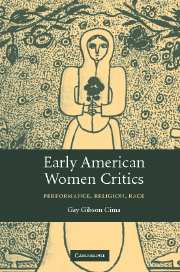Book contents
- Frontmatter
- Contents
- Acknowledgments
- Introduction
- 1 Colonial Women Critics: Performing Religion, Race, Possession, and Pornography
- 2 Revolutionary Women Critics: Performing Rational Christianity, Patriotism, and Race
- 3 Republican Women Critics: Performing Christian Activism, American Culture, and Race
- Index
- References
Introduction
Published online by Cambridge University Press: 22 September 2009
- Frontmatter
- Contents
- Acknowledgments
- Introduction
- 1 Colonial Women Critics: Performing Religion, Race, Possession, and Pornography
- 2 Revolutionary Women Critics: Performing Rational Christianity, Patriotism, and Race
- 3 Republican Women Critics: Performing Christian Activism, American Culture, and Race
- Index
- References
Summary
On 4 July 1740, women originally from Angola, Gambia, Senegal, West India, the Netherlands, France, Spain, England, Ireland, Scotland, and various corners of the American colonies rushed into the streets of Charles Town, South Carolina. They panted, wept, laughed, and fell on the ground shuddering and groaning, only to rise, shout, and commence “damning all others round about them.” In 1772 a prominent Whig playwright excoriated her Governor, King George III's representative in the Massachusetts Colony, characterizing him in scene after scene as “Rapatio”; her play was performed in patriots' parlors across the colony and published in major newspapers. The following year in Boston, as prostitutes began to troll the docks and a diverse, transatlantic community of Christians surfaced, a young West African slave girl published poems and recited them in her mistress's home on the main thoroughfare, warning local Harvard boys to shun the “transient sweetness” of sin and reminding King George that his smile could “set his subjects free.” In the 1790s a Boston minister's wife produced a play which excused married women's flirtations (and her own), even after the publication of a vicious, serialized parody of her as a woman guilty not only of adultery but also of the violent domestic abuse of her husband. In her collected works, she renamed one of her plays Virtue Triumphant.
- Type
- Chapter
- Information
- Early American Women CriticsPerformance, Religion, Race, pp. 1 - 17Publisher: Cambridge University PressPrint publication year: 2006

